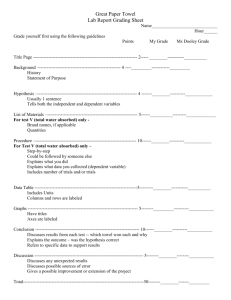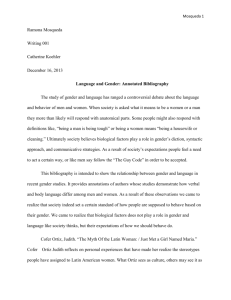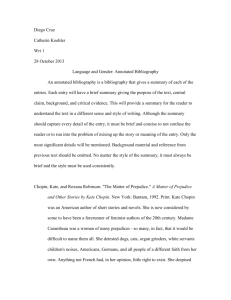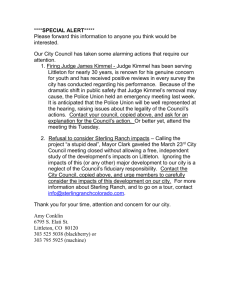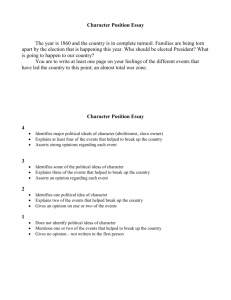Annot. Bib - WordPress.com
advertisement
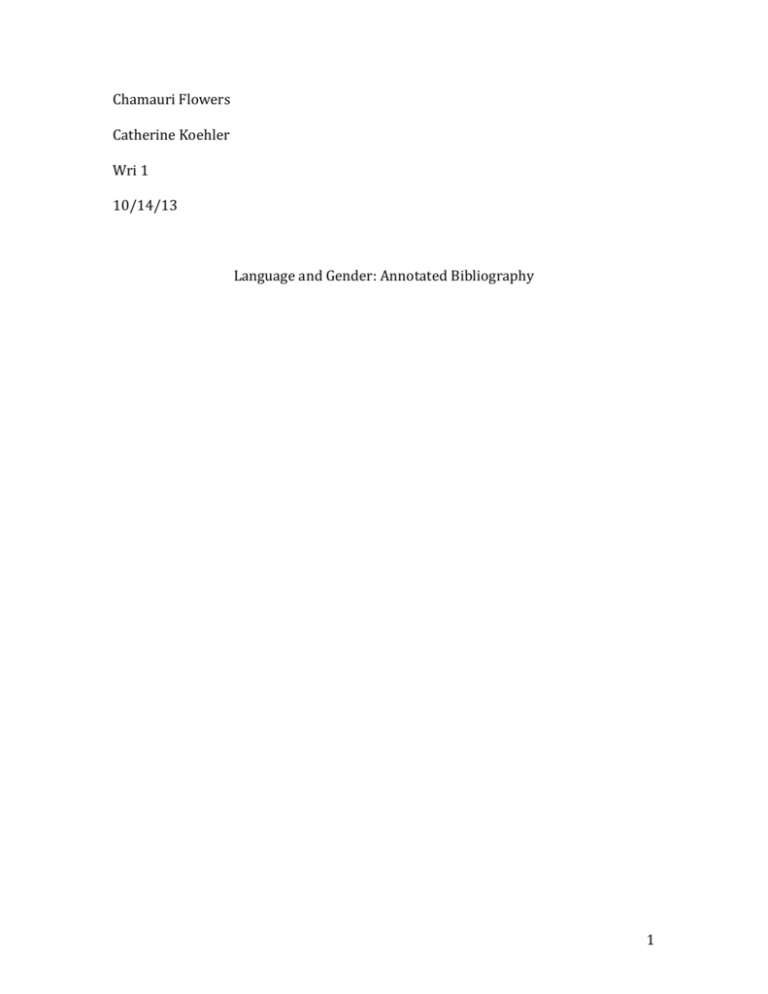
Chamauri Flowers Catherine Koehler Wri 1 10/14/13 Language and Gender: Annotated Bibliography 1 People are judged simply because of their gender or their race, sometimes even both. In America many minority groups get the feeling that if they were part of the majority they would be treated different. Many women may also feel that if they were a man that they may be treated different as well. I say the word “Different”, meaning that women and minorities feel that they might be given the proper respect. In the media gender roles are quite common to show the woman being subordinate, kitchen dwellers, cleaners, and subdued to being an object of sex; while males are commanding, breadwinners that makes the money to support the family. Language creates another type of barrier between the minority and majority. Language keeps the minority from communicating on an equal level with the majority. Many writers have gone over these topics to make a connection of barrier between majority and minority. Cofer, Judith O. “The myth of the Latin Women: I Just Met A Girl Named Maria”. My Teacher Pages, NA. Web. 15/10/2013. http://www.myteacherpages.com/webpages/rspriggs/files/i%20just%20m et%20a%20girl%20named%20marie%20text.pdf. Judith Ortiz Cofer, a Puerto Rican author who has published several books, discusses how people view the Latin woman. In her writing she gives personal information on the different ways she has been disrespected because of how others view the Latin woman. She not only talks about first hand experience, but she also discusses what others go threw that are close to her. Cofer discusses how television has an affect on the culture of the people. She explains how people 2 believe the Latin woman that is shown on TV is a general look at all Latin women. She talks on how Latin women are being portrayed as kitchen maids, servants and are uneducated and hardly able to speak English. Her writing shows how our culture is influenced to believe what they see on TV to be true. Kimmel, Michael.”’Bro’s Before Ho’s’: The Guy Code”. Language and Awareness, NA. 15/10/2013. Michael Kimmel is a distinguished Professor on Sociology and has written many books on men and their masculinity. In “’Bro’s Before Ho’s’: The Guy Code” Kimmel explains how he asked many men in the world the question “what does it mean to be a man?” Kimmel explains how he talked with several men across the United states and even in other countries and the responses were quite similar. Many men believe that being soft or sensitive is not what a man should be, anything that shows weakness should not be in a man, or a man should not show it. Surprisingly when Kimmel asked women what does it mean to be a woman, they did not have as sturdy responses as men. Kimmel discusses how his research shows that men want to be “manly” to show themselves approved by other men, and that women are not even factors. Kimmel examines how men are afraid of other men seeing them as weak, or gay. He found a quote by Eminem, “The lowest degrading thing you can say to a man when you’re battling him is to call hi a faggot and try to take away his manhood.” Men are afraid of being seen as a faggot. 3 Marquez, Myriam.”Why and When we Speak Spanish in Public”. Language and Awareness, NA. 15/10/2013. Myriam Marquez is an award-winning colomnist for the Orlando Sentinel. Marquez explains how some people may feel insecure when they hear people speak a foreign language in public places. Her family has been in the United States for over forty years and they still prefer to speak Spanish as their family’s language. Krauthammer, Charles.”In Plain English: Let’s Make It Official.NA:NA Charles Krauthammer discusses the issue of how the United States could not declare English its official language. Krauthammer relates this issue to the amount of Spanish speakers in the United States. The Senate is afraid of making this decision for fear of being seen as racist. They do not want the United States to seem like a divided nation. Krauthammer shows how language can create a barrier between two cultures, even if they do reside in the same nation. He shows that America has declared English its nation language instead of its “official” language. The luxury of having English as Americas official language shows that we recognize our heritage and where we came from, but some believe that by making English our official language would be a racist move because it does not include the growing population of Spanish speakers. Zeisler, Andi. “The B Word? You Betcha.” Washington post. Washington Post, 18 Nov 2007. 15 Oct 2013. https://www.filepicker.io/api/file/QpmrsgwSuaWjNqLO58Qm. Andi Zeisler is the co-founder of “Bitch” magazine. She explains how working her job 4 comes with a lot of responsibilities. She explains how people look to her magazine when the word “Bitch” becomes controversial in the media. Zeisler talks about how people connect the word to women. People believe because she is a woman that owns a magazine entitled “Bitch” that she accepts the word and agrees with its use. This form of language could be culturally accepted and seen as taboo by many people, usually the youth accept it more. Zimmer, ben. “How Twitter Language Reveals Your Gender- Or Your Friends’” BostonGlobe.com.The Boston Globe, 04 Nov. 2012. Web. 23 Oct. 2013. http://www.bostonglobe.com/ideas/2012/11/03/how-twitter-languagereveals-your-gender-your-friends/e68H6Z0Z2GAfnJ6UjU3IxO/story.html Ben Zimmer is an executive producer of the Visual Thesaurus and Vocabulary.com, and is also a language columnist for the Wall Street Journal. In his article, “How Twitter Language Reveals Your Gender- Or Your Friends’”, Ben Explains how certain keywords allow him to recognize whether the writer is a male or female. People in the “twittersphere” have a totally different language. Emoticons and abbreviations are used for messages. Zimmer explains how through research he understands that women are more likely to use emoticons and men are more likely to use words that are thought of as taboo. Those who use twitter are familiar with “luv, omg, 143” and others. These different ways of communicating with each other, Zimmer explains could lead to new rules in language, and could weaken the language barrier. 5 6
